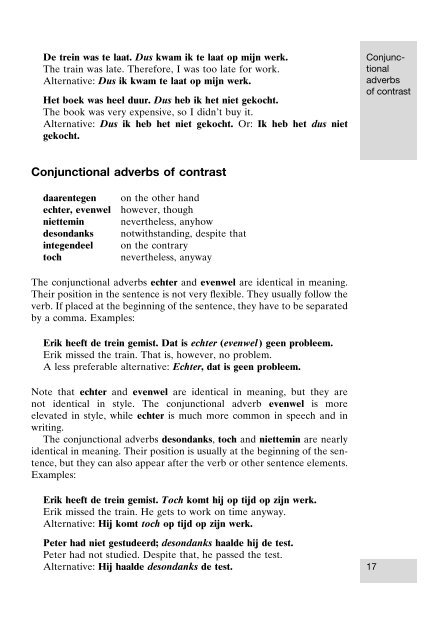er - Home
er - Home
er - Home
You also want an ePaper? Increase the reach of your titles
YUMPU automatically turns print PDFs into web optimized ePapers that Google loves.
De trein was te laat. Dus kwam ik te laat op mijn w<strong>er</strong>k.<br />
The train was late. Th<strong>er</strong>efore, I was too late for work.<br />
Alt<strong>er</strong>native: Dus ik kwam te laat op mijn w<strong>er</strong>k.<br />
Het boek was heel duur. Dus heb ik het niet gekocht.<br />
The book was v<strong>er</strong>y expensive, so I didn’t buy it.<br />
Alt<strong>er</strong>native: Dus ik heb het niet gekocht. Or: Ik heb het dus niet<br />
gekocht.<br />
Conjunctional adv<strong>er</strong>bs of contrast<br />
daarentegen on the oth<strong>er</strong> hand<br />
echt<strong>er</strong>, evenwel howev<strong>er</strong>, though<br />
niettemin nev<strong>er</strong>theless, anyhow<br />
desondanks notwithstanding, despite that<br />
integendeel on the contrary<br />
toch nev<strong>er</strong>theless, anyway<br />
The conjunctional adv<strong>er</strong>bs echt<strong>er</strong> and evenwel are identical in meaning.<br />
Their position in the sentence is not v<strong>er</strong>y flexible. They usually follow the<br />
v<strong>er</strong>b. If placed at the beginning of the sentence, they have to be separated<br />
by a comma. Examples:<br />
Erik heeft de trein gemist. Dat is echt<strong>er</strong> (evenwel) geen probleem.<br />
Erik missed the train. That is, howev<strong>er</strong>, no problem.<br />
A less pref<strong>er</strong>able alt<strong>er</strong>native: Echt<strong>er</strong>, dat is geen probleem.<br />
Note that echt<strong>er</strong> and evenwel are identical in meaning, but they are<br />
not identical in style. The conjunctional adv<strong>er</strong>b evenwel is more<br />
elevated in style, while echt<strong>er</strong> is much more common in speech and in<br />
writing.<br />
The conjunctional adv<strong>er</strong>bs desondanks, toch and niettemin are nearly<br />
identical in meaning. Their position is usually at the beginning of the sentence,<br />
but they can also appear aft<strong>er</strong> the v<strong>er</strong>b or oth<strong>er</strong> sentence elements.<br />
Examples:<br />
Erik heeft de trein gemist. Toch komt hij op tijd op zijn w<strong>er</strong>k.<br />
Erik missed the train. He gets to work on time anyway.<br />
Alt<strong>er</strong>native: Hij komt toch op tijd op zijn w<strong>er</strong>k.<br />
Pet<strong>er</strong> had niet gestude<strong>er</strong>d; desondanks haalde hij de test.<br />
Pet<strong>er</strong> had not studied. Despite that, he passed the test.<br />
Alt<strong>er</strong>native: Hij haalde desondanks de test.<br />
Conjunctional<br />
adv<strong>er</strong>bs<br />
of contrast<br />
17


